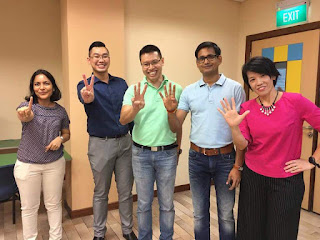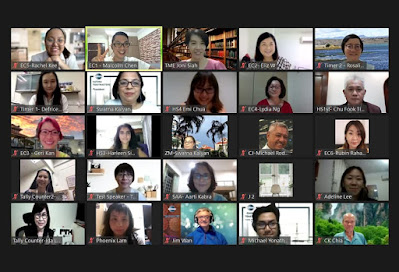Project 2: Protein Myth and Project 3: Pay It Foward
PROJECT 2: PROTEIN MYTH
What do Arnold Schwarzeneggar, Martina Navratilova and Carl Lewis have in common ?
First, they are champions in their respective sports. Second, they are very fit and muscular, and Third, they are vegetarians.
Toastmasters, Ladies and Gentlemen:
This evening, I want to share with you 3 popular misconceptions about plant proteins.
MYTH NO 1: YOU CANNOT GET ENOUGH PROTEIN ON A VEGETARIAN DIET
The World Health Organization recommends 0.8 gram of protein daily for every kilogram of body weight for both man and woman.
Using this guideline, a 50 kilogram person needs 40 grams of protein a day, while a 70 kilogram person needs 56 grams of protein daily.
So how MUCH is 40-50 grams ? 50 grams is equivalent to 10 sheets of A4 size paper. 50 grams is also equivalent to HALF the weight of my hand phone. As you can see, 50 grams is NOT very much is it ?
Let’s look at Table 1 which shows the Quantity of grains, pulses (beans, peas and soy products) and nuts that contains 50 grams of protein:
As you can see from the Table, 500 grams of white rice contain 50 grams of protein; so does 208 grams of pasta, 666 grams of white bread, and 390 grams of cereal.
I like you to look at the numbers for peanuts and papadum…..you only need to consume 200 grams of peanuts and about 300 grams of papadum daily to get your 50 grams of protein.
This Table clearly shows that vegetarian diets are not poor in protein.
MYTH NO 2: PLANT PROTEINS ARE INCOMPLETE.
Our body needs 20 amino acids for growth, repair, and for the production of hormones and enzymes. Of the 20 amino acids, 8 of them are essential - essential not because they are more important, but because the body cannot produce them and therefore, you must get them from your diet.
Animal proteins are complete proteins because contain the 8 essential amino acids.
Plant proteins are incomplete proteins because they do not contain all the 8 amino acids.
Let’s look at Table 2 which shows the amount of essential amino acids a 50 kilogram person requires daily. The current recommendation by the World Heath Organization is 9,350 milligrams or 9.35 grams daily.
So how do we get these amount of essential amino acids if plant protein is “incomplete” as mentioned earlier? The answer is in Complementary Protein.
Complementary Protein is the method of combining a food that is high in certain amino acids but low on others, with another food that has the opposite profile.
What does this mean in practice? It is a tedious process. Let’s look at Table 3 which shows food combinations that contain all 8 essential amino acids:
Bread and butter
Bread with Poppy seeds or sesame seeds
Cake with Milk
Cereal with Milk
Cheese, Bean sprouts, croutons salads
Egg and Toast
Grilled Cheese Sandwich
Peanut Butter Sandwich
Pizza
String Beans with Almonds
As you can see, these are food you are probably eating on a daily basis now. Therefore, it is not difficult to get the 8 essential amino acids even if you are a vegetarian!
MYTH NO 3: ANIMAL PROTEIN BUILDS STRONGER BONES
Excess protein cannot be stored in the body directly. They have to be converted to carbohydrate or fat and then stored in the body.
When we take too much protein, the body has to work harder to get rid of the excess through conversion.
Animal proteins have Ammonia and Sulfur in their molecular structure. In conversion, the Ammonia is purged as urine, and the sulfur is converted to sulfuric acid in the stomach.
To buffer the sulfuric acid, the body uses Calcium from the bones to neutralize the acid.
Calcium is the element that makes our bone strong. So when we lose calcium, we are weakening our bones, not strengthening it.
CONCLUSION
These 3 myths show that Animal Protein is NOT better than Plant Protein. Increasingly, studies have shown that Plant Protein is in fact superior to Animal Protein in more ways than we had previously thought.
The challenge for us is to separate facts from myths.
Toastmasters of the Evening.
PROJECT 3(GET TO THE POINT): PAY IT FORWARD
Toastmasters, Ladies and Gentlemen:
I like to share with you a story that touches my heart to its very core.
It is a story of human kindness and dignity: A story of doing a good deed for another human being, simply because he is a human being. It is also a story of the effect of being kind to another human; the effect of paying it forward. It is a story of life, coming full circle.
When Jane discovered that she had terminal cancer, she was 38 years old, and in the prime of her life. She had a good job, a loving husband, and 2 beautiful children. They lived in a house filled with love.
Jane and her husband sought the best medical advice. The prognosis was the same; she only had a year or so to live. She was devastated. The children were only 10 and 12 years old. How could they cope without her. How would her husband cope without her? The thought brought her to tears every night.
One day, 6 months after the news, she met an old friend from school. This friend was also married. Her husband was suffering from kidney failure and had been on dialysis for the past 3 years. They had used up almost all their savings. She was at her wits’ end.
That evening, Jane told her husband that she wanted to write a living will. In that will, she would donate her kidneys to her friend’s husbands, if she were to die first. She and her husband also decided to donate her eyes and liver to others who needed them.
That evening, after writing her living will, she felt a sense of relief and confided to her husband that she was ready to meet her maker. He broke down and cried, for the first time since her prognosis. He cried so hard, the children rushed to their room because they though their Mama had passed away. They cried along with their daddy and asked their mama not to go that night, and that they would trade places with their mama if she promised to stay. That night, they all cried, as if it was her last night.
Jane got weaker and weaker with the chemotherapy. Her husband got more and more tired as he had to take care of the children, the house and his job. The children got quieter and quieter. They withdrew.
Soon, Jane got too weak and had to be hospitalized. Her husband did not want her to stay home by herself while he was at work.
She passed away on a Sunday morning after her husband sang her “Amazing Grace”, her favorite hymn. The living will was executed, and Jane’s kidneys, eyes and liver was removed and transported to nearby hospitals for transplant.
A year passed. One day, Jane’s friend, whose husband had received Jane’s kidneys. visited. She said her husband was leading a normal life now, thanks to Jane’s generosity. On leaving, she said one of her neighbors had a liver transplant while his blind daughter had also received 2 new eyes.
Jane’s husband told Jane’s friend about Jane’s living will. They both wondered if the neighbor and his daughter had Jane’s liver and eyes.
One day, the family visited Jane’s friend. The neighbor, whose daughter could now see, was also at her house. When they saw the girl’s eyes, they knew: the girl had Jane’s eyes. They felt so hurt they left before dinner. When they got home, they cried. They felt as if Jane had to die so that 3 other person could live ! Life was unfair.
The 2 girls cried themselves to bed while Jane’s husband headed for the liquor cabinet. He drank and drank. He did not want to live anymore. The only thing that kept him going was the 2 girls; Jane’s girls, his girls.
The next day, as he drove the girls to school, his mind was on how to end his life. A bell was ringing. Bam !! A train hit the car and dragged it along until it was severed in half.
All 3 were rushed to the nearby hospital in critical conditions.
5 km away, there was another car accident. In the car was
Jane’s friend, her husband, who had Jane’s kidneys and the neighbor who had a liver transplant and his daughter who had Jane’s eyes. All 5 died instantly when their car collided with a truck.
Their bodies were moved to same hospital where Jane’s family was.
One of Jane’s girl had both kidneys crushed and an eye pierced. The other girl also had an eye destroyed in the accident. Jane’s husband needed a liver.
By a stroke of miracle, Jane’s kidneys, liver and eyes were transplanted into her family members.
Jane had paid it forward. Her kindness had come full circle.


Comments
Post a Comment
Do contact Cherylene (VP Public Relations) at +65 9012 3661 for more details.